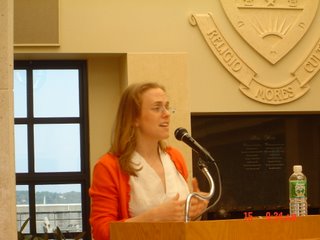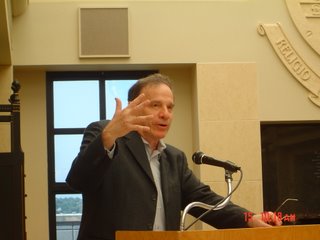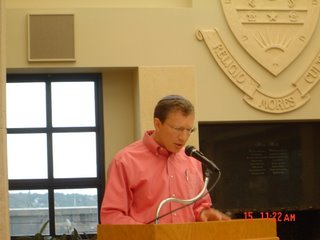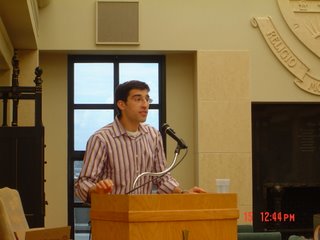 (For the first three posts from Tuesday, see here, here, and here (respectively). For the two posts from Wednesday, see here and here (respectively).)
(For the first three posts from Tuesday, see here, here, and here (respectively). For the two posts from Wednesday, see here and here (respectively).)Thursday morning of the conference began with two presentations: one by Dr. Miri Freud-Kandel on "Anglo-Jewish Orthodoxy in Transition: 1960-1970" (focusing on the Jacobs Affair) and one by Dr. Rabbi Lawrence Kaplan on "Introductions to Judaism of Isadore Epstein, Aron Barth, Herman Wouk, and Eliezer Berkovits: Why Alexander Littman Was Wrong" (unfortunately, my recording
 device ran out of battery juice (unbeknownst to me until after the speech), so it cuts out during his speech and the comments section is missing). One interesting line that follows directly after Dr. Freud-Kandel's lecture prior to the rest of the comments was said by David Singer:
device ran out of battery juice (unbeknownst to me until after the speech), so it cuts out during his speech and the comments section is missing). One interesting line that follows directly after Dr. Freud-Kandel's lecture prior to the rest of the comments was said by David Singer:The Hertz Chumash is a British import. People who, like me, went to Yeshiva College in the 1960s who were crazy enough to care about Modern Orthodoxy, we were always bewailing the fact "Why is it that American Jewry could not produce something like the Hertz Chumash?" And, of course, we all know - I try to be fair and objective and scholarly, but at the personal level - this has has been now replaced by Artscroll. Which, to its credit, takes care of a vacuum. Of course, it's a tremendous indictment to Modern Orthodoxy.This last comment reminded me
 of something I heard in passing in school about one day creating a Modern Orthodox Humash, though I don't know how soon something like that will come about. Maybe someone with the interest, the know-how, and the time will be able to come up with that work, but it has yet to come out.
of something I heard in passing in school about one day creating a Modern Orthodox Humash, though I don't know how soon something like that will come about. Maybe someone with the interest, the know-how, and the time will be able to come up with that work, but it has yet to come out.After these two, the conference moved into the last set of speeches, entitled "Formative Events of the 1960's". The first of these was given by David Landes on "The Birth of the Modern Orthodox Clinic: Modernity and Medicine" (unfortunately, having run out to get a battery for my recording device, the first few minutes are missing). The second by Adam Ferziger on "Modern Orthodoxy and the Soviet Jewry Movement." Responding to Rabbi Yehudah Mirsky's question concerning a relationship to the kiruv movement, Dr. Ferziger said the following about Modern Orthodoxy and the kiruv movement:
Number one, the Modern Orthodox who once championed kiruv, did it at the same time as they did Soviet Jewry; and at the same time as they sort of lost their passion in these types of activities, they also lost their passion for kiruv, because they becameThe last was given by Josh Teplitsky on "Modern Orthodoxy and the Vietnam War."survivalist and they started worrying about their own inner problems and didn't have time for everybody else, which is part of the problem.
The second point is that the more interesting aspects of kiruv today, in terms of modernity and the influence of modernity, are davka in the haredi world. And its the haredi world which, because of their interaction with as kiruv workers with nonobservant jews have begun to live in these community kollels...and are being then influenced by their own surroundings, bringing their own chilren up in these - Atlanta, Phoenix, and San Jose, that there, you see interesting issues of passion and post-denominationalism sort of begin to emerge.
Following the last set of speeches came a go around the room seeking comments and suggestions. One of the most interesting comments came from Rabbi Yehudah Mirsky who, in response to a comment about the lack of negativity during the conference, he said that we were talking about only up until 1970, "it's still humble and moral." It certainly helped me gain a better understanding of Modern Orthodox history - it seemed
 that there was a turn for Centrist Orthodoxy, though I'm now left on not really being clear on what went wrong in the last few decades in Modern Orthodoxy. Daniel Statman suggested a more diverse audience in attendance, including more non-Modern Orthodox Jews and non-Jews, as well. Another point made was by Rabbi Ariel Picard about defining domains, such as sociological and philosophical (such as theory of halakhah). A couple of people had pointed to the greater need for looking at what was going on more on the ground. One suggestion I have for that is to see how the greater suburbanization in the post-war era had on this element of life. Lastly, Hanoch ben Pazi suggested a greater look at how the Conservative movement might have affected Modern Orthodoxy.
that there was a turn for Centrist Orthodoxy, though I'm now left on not really being clear on what went wrong in the last few decades in Modern Orthodoxy. Daniel Statman suggested a more diverse audience in attendance, including more non-Modern Orthodox Jews and non-Jews, as well. Another point made was by Rabbi Ariel Picard about defining domains, such as sociological and philosophical (such as theory of halakhah). A couple of people had pointed to the greater need for looking at what was going on more on the ground. One suggestion I have for that is to see how the greater suburbanization in the post-war era had on this element of life. Lastly, Hanoch ben Pazi suggested a greater look at how the Conservative movement might have affected Modern Orthodoxy.--------------------------------
Tags: American Modern Orthodox Judaism, Edah, University of Scranton, Modern Orthodoxy, Modern Orthodoxy Conference, historiography, Judaism, history, Orthodox Judaism, American Modern Orthodoxy, Jacobs Affair, English Jewry, Louis Jacobs, Isadore Epstein, Aron Barth, Herman Wouk, Eliezer Berkovits, Artscroll chumash, Hertz chumash, Soviet Jewry movement, Vietnam war, Artscroll
3 comments:
Thank you for your work in blogging and recording. Incidentally, though it's not a new Hertz Humash, the first work of Open Orthodox, the YCT Tanakh Companion to the Book of Samuel, is now available for preorder.
1) How is Hertz not an "American production" in part? Wasn't he the first ordinee of JTSA?
2) Did you tape the closing roundtable? Or is it just on the end of the last talk?
Thanbo,
1) You make a good point, but your question is answered in the audio file. It's still mainly a British import.
2) I did not record the closing roundtable. Sorry.
Post a Comment